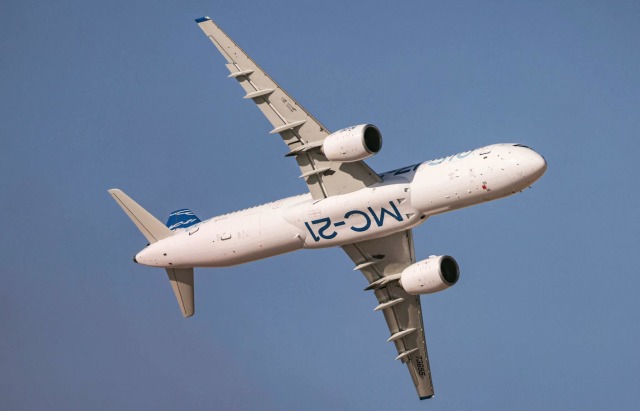Denis Manturov, the head of the Ministry of Industry and Trade, told what plans the Russian aircraft industry has in the face of Western sanctions due to the situation in Ukraine.
Serial production of the import-substituted version of the Russian medium-haul narrow-body passenger MC-21 is planned to begin in 2024, the head of the Ministry of Industry and Trade Denis Manturov told reporters at today's briefing.
"<...> Any component that changes in an airplane requires appropriate procedures and tests to meet all aviation safety requirements," he said. According to Manturov, foreign manufacturers refused to supply parts for the Russian aircraft without explanation - even for orders for which they made an advance payment.
Certification of the MS-21 continues, two aircraft will be put into trial operation by the end of this year.
As for the short-haul narrow-body Sukhoi Superjet 100, capable of carrying from 87 to 108 passengers over a distance of up to three thousand kilometers (base model) and up to 4.5 thousand kilometers (extended-range version), 19 such aircraft are planned to be produced this year.
"There is a complete set of foreign equipment for 19 boards, and contracts in the amount of 19 cars will be executed by the end of the year. Plus part of the sides, which we have so-called white tails. These are the machines that were not previously implemented by the customer. We are now bringing them up to airworthiness, and they will also be delivered to our Russian operators," the head of the Ministry of Industry and Trade said.
They want to certify the SSJ100 import-substituted liner next year. Deliveries to companies can begin, again, from 2024.
From the idea discussed in the media and among experts to resurrect the serial production of the passenger Tu-204, the development of which began under the USSR, Manturov urged to abandon. "There is a possibility of expanding production volumes, but we proceed from common sense, bearing in mind that the MS-21 is similar in characteristics in terms of passenger capacity to the Tu-214 and 204. And we will proceed from the fact, first of all, that the 214th machines, which are currently produced at the Kazan Aviation Plant, are supplied mainly to state aviation," he explained. At the same time, they want to allocate additional assembly capacities for the Tu-214 in order to eventually increase production from three to ten aircraft per year.
Although none of the foreign companies from the sphere of trade and industry spoke about their final withdrawal from the Russian market, Manturov stressed that no one would wait forever for them: an enterprise in idle time means unpaid taxes and degradation of production.
"With someone we have a clear understanding that they are preserved, as well as production facilities and supplies of components in our market. Unfortunately, we may have to say goodbye to someone, because we cannot wait indefinitely. <...> I really hope that we will come to some common denominator before the end of this month or before the beginning of April. Because we are not sitting still, we are forming an agenda and plans for how each of the enterprises in Russia will function," the minister summed up.
After the start of the military special operation in Ukraine, the reaction of Western countries and their companies followed: for example, the European Union (as well as the USA and Canada) not only suspended flights over its territory for Russian aircraft, but also announced a ban on the supply of civilian aircraft and spare parts to Russia. Lessors are obliged to complete contracts with domestic airlines by the end of March, and it is also impossible to service and insure aircraft. In addition, the US Ministry of Commerce banned any servicing of 100 airliners that recently flew to Russia (the list included Aeroflot's Boeing, Utair, Azur Air, Nordwind, AirBridgeCargo, Aviastar-TU and Gulfstream G560 of billionaire Roman Abramovich).
Russian airlines, whose boards are listed in foreign registers, in order to avoid their arrest, stopped flights abroad from March 6, from abroad - from the eighth. As the head of the Ministry of Transport Vitaly Saveliev reported today, a total of 111 air carriers lost 78 of 1367 aircraft - they were arrested outside Russia. Eight hundred cars have already been transferred to the Russian registry.
Vladimir Putin signed the law on registration of rights to foreign aircraft leased from our airlines on March 14. It is also allowed to issue them Russian certificates of airworthiness.



